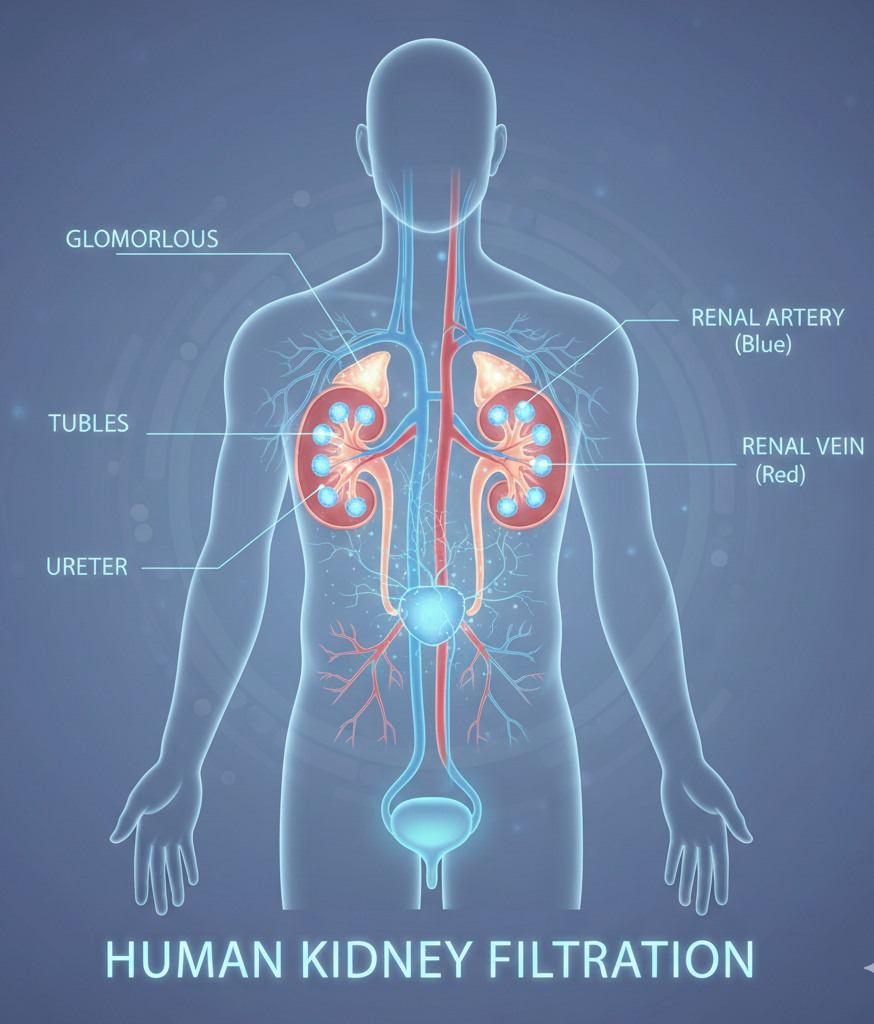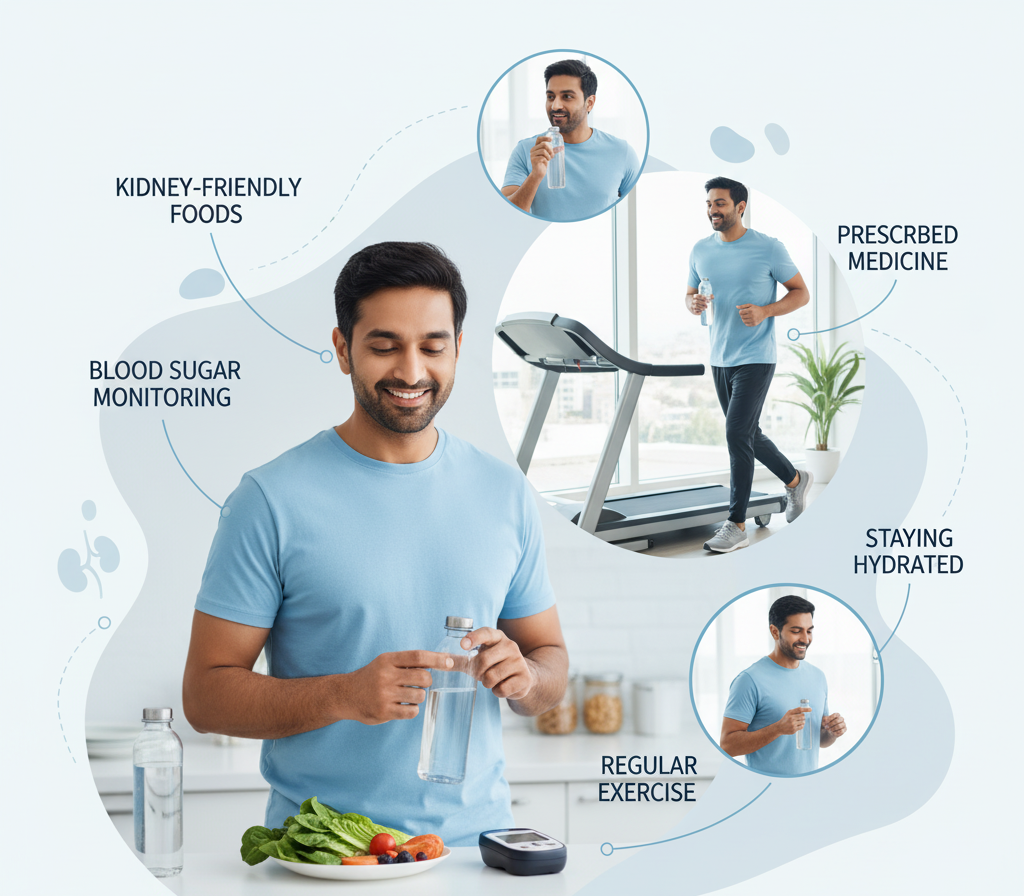Introduction
Kidneys work quietly every second — filtering blood, maintaining fluid balance, removing toxins, and supporting overall health. Yet kidney problems in India are rising rapidly due to lifestyle changes, unawareness, and chronic conditions like diabetes. More than 70% of early kidney damage remains undetected because symptoms appear very late. This makes kidney care extremely important, especially when small daily mistakes can silently harm kidney health over many years.
This blog explains three common yet dangerous habits that gradually damage the kidneys. These mistakes often go unnoticed but can lead to chronic kidney disease, high creatinine levels, dialysis needs, or even kidney failure if ignored. Understanding these risks early can help you protect your kidneys for life.

Mistake 1: Ignoring Chronic Conditions Like Diabetes and High Blood Pressure
Diabetes is one of the biggest causes of kidney disease in India. High blood sugar damages tiny blood vessels inside the kidneys, making them lose their filtering ability. When diabetes is uncontrolled for years, kidneys slowly deteriorate until they reach a stage where they are unable to function properly.
High blood pressure has a similar impact. It puts extra pressure on kidney blood vessels, causing them to harden and narrow. Once damaged, these vessels cannot filter waste effectively. Many people ignore borderline or mildly high blood sugar and blood pressure thinking they are harmless. But these numbers slowly but surely damage kidney tissues.
Uncontrolled diabetes can lead to diabetic nephropathy — a major cause of kidney failure. Many patients discover kidney damage only when symptoms appear, but by then, more than 60–70% of kidney function may already be lost. Regular monitoring of blood sugar, HbA1c, blood pressure, urine protein, and creatinine levels is essential.
Managing diabetes properly protects kidney health. Diet control, medication adherence, timely doctor visits, and regular health checkups significantly reduce the risk of kidney complications. Even small changes — like reducing added sugar, limiting processed foods, walking daily, and taking medicines on time — can prevent years of kidney damage.
Mistake 2: Overusing Painkillers and Self-Medication
Painkillers like diclofenac, ibuprofen, aspirin, and even some over-the-counter combination tablets can cause serious kidney damage when overused. Many Indians take painkillers frequently for headache, fever, joint pain, menstrual pain, or back pain without realizing their long-term impact.
These medicines reduce blood flow to the kidneys, causing inflammation and structural damage. In many cases, people consume them daily or weekly for months for chronic pain, leading to a condition called analgesic nephropathy. This type of kidney damage develops slowly and shows symptoms only at a later stage.
Self-medication makes the problem worse. People often combine multiple painkillers, take double doses, or keep switching brands assuming they are safe. Even herbal or “natural” pain-relief products bought without medical guidance may harm kidneys because many contain hidden steroids or harmful ingredients.
Painkillers should only be taken under medical supervision. Chronic pain should be evaluated by a doctor rather than repeatedly treated with self-medication. Using heat therapy, physiotherapy, stretching exercises, hydration, and lifestyle modifications can reduce pain and limit dependence on painkillers.
Mistake 3: Not Drinking Enough Water and Ignoring Hydration Needs
Dehydration is one of the simplest yet most overlooked causes of kidney damage. Kidneys require adequate water to filter toxins and maintain electrolyte balance. When a person drinks too little water regularly, wastes accumulate in the bloodstream, increasing the risk of kidney stones, infections, and long-term kidney strain.
India’s hot climate intensifies the problem. Many people drink water only when thirsty, which is not enough, especially for those who work outdoors, exercise, or consume high-salt diets. Chronic dehydration thickens the blood, making it harder for kidneys to filter waste.
Long-term water deficiency also increases the risk of urinary tract infections (UTIs), which can travel up to the kidneys and cause serious damage. Kidney stones form easily when urine becomes concentrated due to low water intake.
Drinking sufficient water throughout the day is a simple yet powerful way to maintain kidney health. Hydration needs vary based on age, weight, climate, and activity, but most adults require at least 7–10 glasses daily, unless a doctor recommends restrictions due to kidney disease or heart issues.
ALSO READ: Stanford Scientists Discover Aging May Suppress Cancer, Not Fuel It
Early Warning Signs of Kidney Damage
Early kidney damage often shows no symptoms. But some signs may appear when kidney function starts declining:
-
Persistent fatigue or weakness
-
Swelling in feet, ankles, or face
-
Changes in urine colour or quantity
-
Frequent urination at night
-
Foamy or bubbly urine (a sign of protein loss)
-
Poor appetite or nausea
-
Itchy skin due to toxin buildup
-
High blood pressure
-
Unexplained weight changes
Anyone with diabetes, high BP, or a family history of kidney disease should take these symptoms seriously.
How Kidney Damage is Diagnosed
Kidney problems can be detected through simple and affordable tests:
-
Blood creatinine test
-
eGFR (estimated glomerular filtration rate)
-
Urine albumin test
-
Urinalysis
-
Kidney ultrasound
-
Blood pressure monitoring
-
HbA1c to assess diabetes control
Regular screening helps catch damage early, when it can still be reversed or slowed.

Kidney-Friendly Treatment and Lifestyle Guidance
Depending on the condition, treatment may include:
-
Better diabetes control
-
Blood pressure medicines
-
Reduced intake of salt, sugar, and processed foods
-
Stopping painkiller overuse
-
Adequate hydration
-
Weight management
-
Controlling cholesterol
-
Treating infections promptly
-
Monitoring creatinine and urine protein levels
Kidney damage is manageable when detected early.
Prevention: How to Protect Kidneys for Life
-
Maintain stable blood sugar and blood pressure
-
Drink enough water daily
-
Avoid frequent painkiller use
-
Choose fresh, home-cooked meals over packaged foods
-
Reduce salt and sugar intake
-
Exercise at least 30 minutes daily
-
Limit alcohol
-
Quit smoking
-
Get annual kidney tests if diabetic or hypertensive
-
Treat urinary infections early
Small everyday changes can prevent long-term complications.

When to See a Doctor
Consult a doctor or nephrologist if you notice:
-
Swelling around eyes or legs
-
Sudden change in urination
-
Blood in urine
-
Constant fatigue
-
High creatinine
-
Uncontrolled diabetes or blood pressure
-
Persistent flank or lower back pain
50 FAQs (Kidney Health + Diabetes Control)
Q1. Can diabetes really damage the kidneys over time?
A. Yes, high blood sugar slowly damages kidney blood vessels, leading to chronic kidney disease.
Q2. How often should diabetic patients check kidney function?
A. At least once a year, or more often if advised by a doctor.
Q3. Can drinking too little water harm the kidneys?
A. Yes, chronic dehydration strains kidneys and increases the risk of stones and infections.
Q4. Are painkillers safe for long-term use?
A. No, overuse of painkillers can cause kidney damage.
Q5. What is the earliest sign of kidney damage?
A. Increased urine protein is often the earliest indicator.
Q6. Can kidney damage be reversed?
A. Early-stage damage can sometimes be reversed with proper treatment.
Q7. How much water should I drink daily?
A. Most adults need 7–10 glasses, unless restricted by a doctor.
Q8. What foods help protect kidney health?
A. Fruits, vegetables, whole grains, and low-salt meals support kidney function.
Q9. Can kidney disease cause swelling?
A. Yes, fluid buildup can cause swelling in feet and face.
Q10. Does diabetes always lead to kidney failure?
A. No, good glucose control prevents or delays kidney complications.
Q11. Can I drink coconut water if I have kidney issues?
A. It depends; potassium levels must be monitored.
Q12. Are kidney problems painful?
A. Early kidney disease is usually painless.
Q13. What is creatinine?
A. It is a waste product; high levels indicate reduced kidney function.
Q14. Does stress affect kidney health?
A. Indirectly yes, as it can worsen BP and blood sugar.
Q15. Can kidney damage occur without symptoms?
A. Yes, most early cases are silent.
Q16. Is protein in urine dangerous?
A. Yes, it signals kidney damage.
Q17. Can high blood pressure harm kidneys?
A. Yes, it is a major cause of kidney disease.
Q18. What are kidney-friendly exercises?
A. Walking, yoga, cycling, and low-impact workouts.
Q19. Is alcohol harmful for kidneys?
A. Excessive alcohol strains the kidneys.
Q20. Can UTIs damage the kidneys?
A. Yes, untreated UTIs can lead to kidney infection.
Q21. What is diabetic kidney disease?
A. Kidney damage caused by long-term diabetes.
Q22. Can kidney stones harm the kidneys?
A. Yes, especially if they cause blockage.
Q23. Does a high-salt diet affect kidneys?
A. Yes, it raises BP and damages kidney function.
Q24. How often should I get a urine test?
A. Once or twice a year, more if diabetic or hypertensive.
Q25. Can dehydration cause high creatinine?
A. Yes, low water intake temporarily raises creatinine.
Q26. Are herbal supplements safe for kidneys?
A. Not always; some can be harmful.
Q27. Can kidney disease cause nausea?
A. Yes, due to toxin buildup.
Q28. Are oily foods harmful to the kidneys?
A. They worsen BP and diabetes, indirectly harming kidneys.
Q29. Can losing weight improve kidney health?
A. Yes, it reduces strain on kidneys.
Q30. Is dialysis the only option for kidney failure?
A. Severe cases require dialysis or transplant.
Q31. Can kidney damage occur in young adults?
A. Yes, especially with diabetes or painkiller overuse.
Q32. Do soft drinks harm the kidneys?
A. Excess consumption can worsen kidney health.
Q33. Can I prevent kidney damage if I have diabetes?
A. Yes, with good sugar control and regular checkups.
Q34. Are kidney infections serious?
A. Yes, they require immediate treatment.
Q35. Does smoking harm the kidneys?
A. Yes, it reduces blood flow and increases risks.
Q36. Can exercise improve diabetes control?
A. Yes, regular activity lowers blood sugar.
Q37. What is eGFR?
A. A test that measures kidney filtering capacity.
Q38. Can high protein intake harm kidneys?
A. Excessive intake may strain kidneys in some people.
Q39. What is the normal creatinine level?
A. Around 0.6–1.2 mg/dL for adults; varies slightly.
Q40. Can stress raise blood sugar?
A. Yes, stress hormones can increase glucose levels.
Q41. Is it safe to take painkillers for fever?
A. Yes, short-term use is generally safe.
Q42. Can kidney problems cause back pain?
A. Yes, in advanced cases or infections.
Q43. Should diabetics avoid packaged foods?
A. Yes, due to high sugar and salt content.
Q44. What tests detect early kidney disease?
A. Urine albumin and creatinine tests.
Q45. Can high cholesterol affect kidneys?
A. Yes, it worsens blood vessel damage.
Q46. Does sleep affect kidney health?
A. Poor sleep can worsen BP and diabetes.
Q47. Can kidney disease cause itching?
A. Yes, due to toxin buildup.
Q48. Are fruits safe for diabetes?
A. Yes, in moderation and with proper guidance.
Q49. Can early kidney damage be prevented?
A. Yes, with lifestyle changes and medical care.
Q50. When should I visit a nephrologist?
A. If creatinine is high or you notice signs of kidney dysfunction.
Conclusion
Kidneys are silent workers, but the damage caused by uncontrolled diabetes, excessive painkillers, and dehydration can be severe and long-lasting. The good news is that most kidney problems can be prevented by simple lifestyle choices, regular health checkups, and timely medical care. Protecting your kidneys today ensures a healthier tomorrow.
Quickobook Call-to-Action
Need help managing diabetes, blood pressure, or kidney symptoms?
Book India’s trusted doctors on Quickobook — fast appointments, verified specialists, and online consultations.
Consult a nephrologist
Manage diabetes with experts
Book blood and urine tests
24×7 online doctor support
Book now on Quickobook and take the first step toward better kidney health.
Disclaimer:
This blog is for educational purposes only and not a substitute for medical advice, diagnosis, or treatment. Always consult a qualified doctor for personalized guidance.











Comments (0)
No comments yet. Be the first to share your thoughts!
Leave a Comment